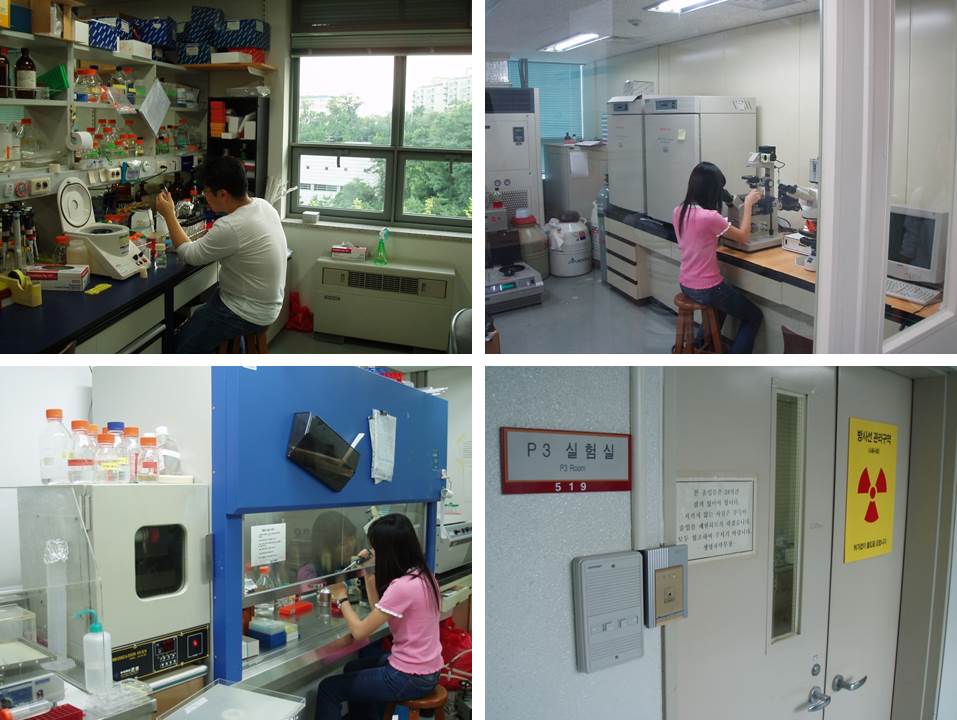Research
우리 연구실은 주변 대기 온도 변화에 따른 생명체의 반응 (특히 개화시기 조절에 대한 기작)에 대한 연구를 하고 있다. 이 기작을 밝혀내기 위해 MADS box 단백질 복합체, small RNA, 개화호르몬의 작용기작을 중점으로 연구를 수행하고 있다.
우리 연구실은 이 연구 분야를 개척하는데 있어서 매우 중요한 기여를 한 것으로 학계에서 인정받고 있다. 우리 연구실의 발견 중 가장 잘 알려진 것은 소수의 유전자가 대기 온도 반응성을 조절하여 온도 반응을 매개한다는 것이다. 이 발견은 대기 온도 변화에 대한 식물의 행동에 대한 분자 유전학적 메커니즘을 밝혀낸 최초의 보고 중 하나이다.
최근들어 전 지구의 온도 변화에 대한 우려의 목소리가 커지고 있다. 이 온도 변화는 지구 생태계를 떠받치고 있는 식물의 생장에도 큰 영향을 미치기 때문에 매우 중요하다. 저온에 의해 조절되는 식물 발달에 대한 연구 결과들은 보고된 바 있었으나, 대기 온도 변화에 대한 반응의 분자 메커니즘에 대해서는 현재 알려진 바가 적었다. 우리의 연구 결과는 식물이 대기 온도 변화에 반응하는 유전 기작에 대한 새로운 해석을 학계에 제시했다.
우리 연구실에서 학계에 보고한 연구 결과를 요약하면 다음과 같다.
- 우리는 대기 온도 경로에 관여하는 유전자가 개화시기를 조절한다는 것을 밝혀냈다 (Nature Genetics).
- 우리는 SVP 유전자가 온도 감지 경로 내에서 작용하고 있다는 사실을 보고했다. 또한 개화 호르몬인 FLOWERING LOCUS T (FT)의 cis-acting element에 직접 결합하여 대기 온도 반응에 역할을하는 것을 밝혀냈다 (Genes and Development).
- 우리는 small RNA가 주위 온도 신호 전달에서 중요한 조절 역할을 하며 SVP가 온도 감지 경로와 대기 온도 반응성 miRNA사이의 연결 고리를 제공한다는 것을 밝혀내었다 (Nucleic Acids Research).
- 우리는 최근 MADS-box 단백질 인 SHORT VEGETATIVE PHASE (SVP)와 FLOWERING LOCUS M-beta (FLM-beta)가 식물에서 온도 반응을 중재하는 복합체를 형성한다는 것을 밝혀냈다. 우리는 전사 수준 (FLM)과 번역 후 수준 (SVP)에서의 SVP-FLM- 베타 개화 억제자 복합체의 조절이 대기 온도 반응에 대한 식물의 반응에 중요하다는 것을 보여 주었다 (Science).
The Ahn lab has made fundamental contributions to the understanding of the control of flowering time by ambient temperature changes. Best known of our discoveries is that a small group of genes that act within a distinct pathway, the ambient temperature pathway, mediate ambient temperature response. This finding was one of the first clues to the molecular genetic mechanism of plants’ behavior to the ambient temperature changes.
There is increasing concern about the potential impact of global temperature changes, which significantly affect ambient temperature, on plant development. Although a great deal of progress has been made in our understanding of the regulation of plant development by low temperature, less is currently known about the molecular mechanisms underlying the responses of plants to changes in ambient temperature. Our findings have provided a new explanation for the genetic mechanisms by which plants respond to ambient temperature changes.
We proposed the ambient temperature pathway genes control flowering time (Nature Genetics). We have shown that SHORT VEGETATIVE PHASE (SVP) acts within the thermosensory pathway and plays a role in ambient temperature response via direct binding to the cis-acting element of FLOWERING LOCUS T (FT), an important floral integrator gene (Genes and Development). In addition, we have shown that small RNAs play an important regulatory role in ambient temperature signaling and that SVP provides a link between the thermosensory pathway and ambient temperature-responsive miRNAs (Nucleic Acids Research). We have recently showed that SHORT VEGETATIVE PHASE (SVP) and FLOWERING LOCUS M-beta (FLM-beta), two MADS-box proteins, form a complex that mediate temperature response in plants (Science). We also showed that control of the abundance of SVP-FLM-beta repressor complex at the transcriptional level (FLM) and at the post-translational level (SVP) is important for plants’ response under continuingly changing ambient temperature conditions.
Selected publications
- Regulation of temperature-responsive flowering by MADS-box transcription factor repressors Science
- A thermosensory pathway controlling flowering time in Arabidopsis. Nature Genetics
- Role of SVP in the control of flowering time by ambient temperature in Arabidopsis. Genes and Development
- Genetic framework for flowering-time regulation by ambient temperature-responsive miRNAs in Arabidopsis. Nucleic Acids Research.
- The microRNA156-SQUAMOSA PROMOTER BINDING PROTEIN-LIKE3 module regulates ambient temperature-responsive flowering via FLOWERING LOCUS T in Arabidopsis Plant Physiology

국가
대한민국
소속기관
고려대학교 (학교)
연락처
02-3290-3451 https://witch.korea.ac.kr/kufaculty/pbioa/index.do?_ga=2.261459661.1928951941.1572827229-1372214273.1572509760
책임자
안지훈 jahn@korea.ac.kr


